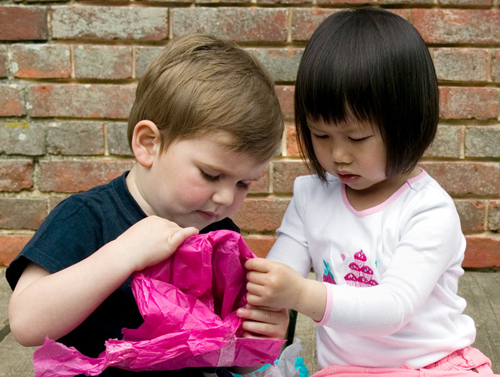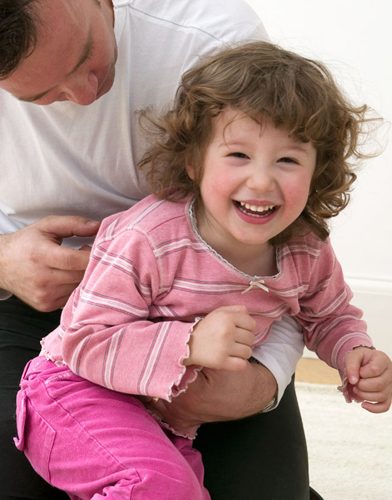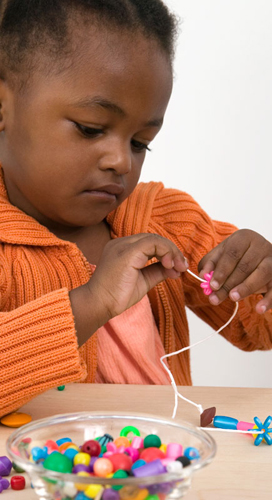Play and learning are very closely linked throughout the toddler years, and your child will love nothing more than to have your involvement. The hours you spend playing with him are never wasted time; he is learning from you all the time and needs as much attention as you can manage to give.
“Overseeing toddlers playing together is not about taking control and directing their behavior; it is about keeping an eye on the situation and helping them to ease their way out of trouble when flare-ups occur.”
“Break things down into small steps. Your toddler can’t take in more than one or two pieces of information at a time, so he needs you to help him take in what you are saying gradually.”
“Teaching him to be curious now will help foster a healthy attitude to learning later.”
“Nurturing creativity in all areas will help your child make greater use of his mind and imagination and develop his reasoning and imaginative skills.”
A balance between physical and mental play is essential to help your toddler shape up his brain and body for learning. He will learn what is important and how things are valued from the people around him. He will also make discoveries about his own likes and dislikes, how things work, and how to use and develop his personal skills. While play is a natural instinct, it needs to be encouraged so that he knows that he has your regard and approval. Without adult involvement and without playmates, your child may lose interest in playing; and his learning will be compromised. Remember it is the process not the end result that is important. It is the fact he is starting to draw that is the success—not whether the picture really looks like Daddy!
Gender differences tend to show in levels of maturity, and in skill and language development. In both instances, girls tend to develop more quickly. These factors are connected, because language development has an impact on social skills. The differences between the sexes are thought to be largely conditioned by home environment; so by the time a toddler is aged 3–4 he will have a much clearer idea of what it is to be female or male. At the age of 2–3 years, however, toys and games are interchangeable and not all children will be certain of who is a girl and who is a boy.
Play stages
Toddler play develops through several distinct stages. Up until around 24 months, your toddler will have had very little interest in anyone other than you as he played, but his brain has now developed to a point where he is beginning to understand his feelings and to develop imagination. With this comes memory development and his ability to “tune in” to his wider world, which means he is starting to pay more attention to his peer group and wants to be with them, too.
His parallel play skills will continue to develop now. Rather than just playing alongside a child, he may start to show more interest in what the child is doing and will watch and copy some of his actions—although he is not ready to play with other children yet. In time, when he has learned to share and take turns this will develop into more cooperative play. For now, though, the change from solitary to parallel play is challenging enough and your toddler will need your help to cope with it.
Learning to share and take turns
Your toddler will like to rehearse his play actions. You may have noticed that he will try things out on himself, or on you, before he uses his imagination to apply them in a pretend play situation. For example, he might put his teddy bear to bed in the same way you put his baby sister to bed. This process of learning applies to sharing and taking turns, too—but he will need your help to learn. For example, count out candies—one for Mommy, one for him—or as you cut a pizza, tell him you are dividing it to share. When he is playing with another child, explain it is his playmate’s turn to have the toy.
Adjusting to the challenge of socializing with his peers will take some getting used to. The problem for toddlers is that other toddlers may not seem to understand the rules of sharing and taking turns in the way that you have been showing him—so encounters tend to end in tears, tantrums, or aggression quite quickly. You can help by playing a valuable and essential support role. Your toddler needs you to help him rehearse a cooperative style of play, in the safety of his relationship with you, where he can avoid the power struggles and fallings-out that tend to happen with his own age group. He also needs you to stay present when he is in the company of other toddlers, so that you can ease the way if there are signs of tension, and help him transfer his practice skills to a real situation.
In time, once he gets used to interacting with his own age group, you will be able to draw back slightly and allow him to negotiate his own way; but he will need to have come to grips with the basics of sharing first.
Taking turns
While she will be more aware of her playmates, your toddler still does not understand the “rules” of play and still thinks that everything belongs to her.
Developing styles of play
Your toddler has been experimenting with different styles of play since he was born. As a baby, he mastered the art of dropping or banging things out of curiosity and for the sheer joy of making the sound; he will next have developed a masterful array of physical skills, and has since built up his strength through experimental play and exploration. Now that he can combine his sensual awareness with his physical skills and with his rapidly developing imaginative and language skills, a whole new world of pretend play is open to him.
Language play
You may notice your toddler talking to himself. He will comment on what he is doing, how he is feeling, and how he is playing. This important stage is helping him to develop his inner voice and helping him to understand his actions and feelings, and whether he is on track. This voice will gradually quiet and become internalized. At this stage, however, “listening in” to what your toddler is saying to himself will give you an insight into his feelings, reactions, and where his imagination is taking him.
His language play is also about the sheer joy of experimenting with sounds and words. Toddlers often chatter to themselves as they lie in bed at night, and an initial “story” can quickly transform into nonsense-speak such as, “Daddy play with Abby, go see Uncle Bob. Hello Uncle Bob, Bob, Bob. Do you go bob bob? Bobee, bobby bob, bobadob, bob dog.”
We each have an internal voice that comments on our thoughts and actions. It is an important way of self-monitoring and self-control. Children who at an older age have difficulties with self-control may have had difficulties developing their internal voice and therefore self-monitoring is more difficult. You can help your toddler to learn this skill by talking to him about what you are doing and by encouraging commentary, so he can learn to model it. For example: “Mommy is just going to tidy up her plate and mug before she plays with you,” “Daddy is feeling very happy so he is going to come and get you for a big hug,” “I am going to play ball with you and show you how I take turns.”
The inner voice acts as a commentator and can therefore have an impact on developing self-esteem. If you hear your toddler making constantly self-deprecating or critical remarks, it is a sign that he does not appreciate himself or his achievements. You can play an important role in teaching him to value himself and help him to replace the negative thoughts with more positive ones.
Physical play
Children love to keep on the move and at this age find it quite hard to keep still for long. Being able to play in the fresh air—whatever the weather—gives children a sense of freedom. Factors such as energy levels, fatigue, physical temperature, how long he has been playing, personal likes, and whether yours is an “outdoors” kind of family, all play their part in deciding when it is time to change focus. There is no doubt that children find it easier to concentrate on indoor activities such as drawing, puzzles, making things, and story-telling if they have had a chance to burn off some energy. On a simple biological level, physical activity gets the blood circulating and directs more oxygen to the brain and other vital organs—which will keep your child healthy, and help his body to learn more effectively.
Physical play also helps children develop self-confidence. Your praise as he bravely tries the seesaw for the first time, or enjoys the thrill of sitting in a swing (which is very good for developing his sense of balance) will encourage him to trust his physical capabilities. In time, he will be ready to try the jungle gym, too, and to navigate space with other children. Make sure he knows how well he has done in his efforts and encourage him to try new activities. Try not to allow any anxiety you may feel about him falling or hurting himself prevent him from “having a try” in a safely supported context.
Tickle me!
Rough-and-tumble play will delight her because she has your attention. Choose your moment, however, because although these games are great at expending energy, they may make her upset or overexcited.
Creativity
Her ability to concentrate for longer periods will give more scope for creative activities, and you can begin to encourage her to give her creations to people as gifts.
How to play with your toddler
Playtime is a creative and fun time for your toddler—and for you, too. This is a delightful time in your child’s life and he will be constantly surprising both you and himself with his discoveries, abilities, and observations. Children can be very funny at this age (not always deliberately) and often love to entertain and be entertained.
Let your child lead play whenever possible. It is important for him to be able to follow through an idea from beginning to end and to understand that he “has a say.” Keep things simple: children of this age have trouble holding more than one idea in mind at a time. If he has to field your suggestions and interruptions unnecessarily, your toddler will become frustrated and temporarily confused.
Encourage your child’s imagination by introducing pretend objects that represent the real thing—such as toy kitchen equipment, and gardening and DIY tools. In time, your child will be able to create the same effect by using anything at all.